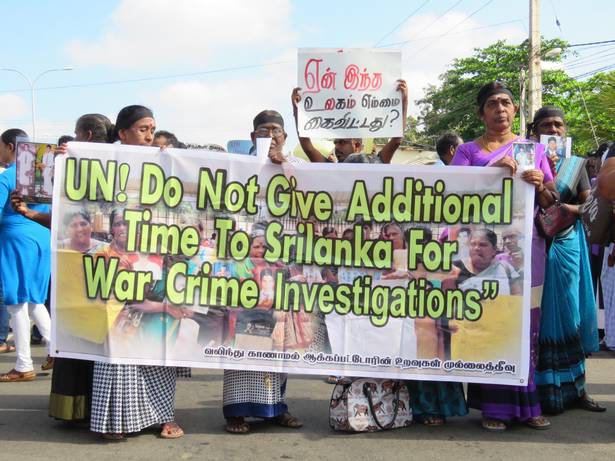A Brief Colonial History Of Ceylon(SriLanka)
Sri Lanka: One Island Two Nations
A Brief Colonial History Of Ceylon(SriLanka)
Sri Lanka: One Island Two Nations
(Full Story)
Search This Blog
Back to 500BC.
==========================
Thiranjala Weerasinghe sj.- One Island Two Nations
?????????????????????????????????????????????????Monday, March 11, 2019
International Women’s Day: A Plea For Helping Tamil Women In Sri Lanka In Their Search For Justice

 As the world marks International Women’s Day, my thoughts are with Tamil women back in the homeland.
As the world marks International Women’s Day, my thoughts are with Tamil women back in the homeland.
Tamil women and girls in the island of Sri Lanka once known as Ceylon
have been fighting against oppression, against marginalization, against
violence, against the relentless persecution of their race for more than
70 years.
Their struggle for freedom and justice hasn’t ended yet.
At the beginning Tamil women agitated for parity in language rights.
This was when the Sinhala only bill was introduced, relegating Tamils
and their language to second class status. All peaceful protests based
on the Gandhian principles of Satyagraha and civil disobedience were
violently crushed.
Upon independence from Britain, and as Sinhala Buddhist supremacist philosophy spread,
bigotry started to rear its ugly head and take root. Ceylon became the
Democratic Socialist Republic of Sri Lanka and the little protection
{section 29 (2)} written into Ceylon’s Soulbury constitution, that
Britain left, to protect Tamils against the ‘tyranny of the majority,’
was illegally removed outside parliament. With the adoption of more
oppressive and discriminative policies, Tamils began to agitate for
separation to chart their own destiny.
The Vaddukodai Resolution of 1976 receiving an overwhelming mandate from the Tamil people in the general election of 1977, declared in no uncertain terms,
“that the restoration and reconstitution of the Free, Sovereign,
Secular, Socialist State of TAMIL EELAM based on the right to self
determination inherent to every nation, has become inevitable in order
to safeguard the very existence of the Tamil Nation in this country.” 

Thus began the struggle for a separate state.
When all peaceful means for liberation was exhausted, Tamil women took
up arms and stood shoulder to shoulder with Tamil men, second to no one,
showing unbelievable and unparalleled courage and chivalry this world
has ever witnessed. They fought hard to liberate the Tamil homeland,
alongside Tamil men, against Sri Lankan army occupation, amidst government sponsored pogroms, the passage of the 6th amendment which criminalized all
advocacy for a separate Tamil state, amid government imposed embargo on
fuel and other necessities, and the arrival of an Indian peacekeeping
force that turned against Tamils.
Tamil women freedom fighters fully involved themselves in a war that lasted nearly 30 years.
The war ended when the Government of Sri Lanka decimated the armed
rebellion and the Tamil liberation movement in May 2009, committing mass atrocities and genocide. Tens of thousands of innocent civilians were killed from government shelling and bombing and through extra-judicial executions.

Today on International Women’s Day, I want to salute the war affected
yet still brave women of Tamil Eelam for their courage, convictions and
fortitude. I salute, the freedom fighters who defended the soil of our
beloved homeland and all those who’ve sacrificed their lives for
freedom. I salute the mothers who desperately want to know the fate of
their children disappeared by the Sri Lankan state, who have kept vigil,
demanding answers and protesting relentlessly for more than two years
out on the street; all the women who are defiant, who won’t give up
fighting to get their land back from an occupying Sri Lankan army; all
the war widows; all the girls orphaned by war; all the single mothers;
all women breadwinners; all the hard working housewives and mothers who
never rest; those women enduring poverty, caught in a debt trap laid by
loan sharks charging exorbitant interest; those women slighted by the
caste system; women who can’t marry because there are fewer men after
the war or have to suffer persecution and harassment from husbands or
in-laws because their parents cannot furnish the dowry demanded of them
and or victimized by the Tamil society’s preoccupation with astrological
considerations and planetary positions; women who have and are
undergoing sterlisation because of purported financial incentives they
have been or were promised, women oppressed and battered by their
husbands or by men in the family; women who are psychologically abused;
women and girls who are victims of incest; women who have to resort to
prostitution for a living; women and girls who have been raped and who
are the victims of sexual violence, abuse and torture.
 I
salute those women who are fighting peacefully and relentlessly for
justice – who want an international judicial accountability mechanism to
try senior Sri Lankan military and political leaders for enforced
disappearances and mass atrocity crimes including genocide. In fact the
mothers of the ‘enforced disappeared’ have written to the UN High Commissioner for Human Rights not to give additional time for war crimes investigations:
I
salute those women who are fighting peacefully and relentlessly for
justice – who want an international judicial accountability mechanism to
try senior Sri Lankan military and political leaders for enforced
disappearances and mass atrocity crimes including genocide. In fact the
mothers of the ‘enforced disappeared’ have written to the UN High Commissioner for Human Rights not to give additional time for war crimes investigations:
“Most
of us personally and voluntarily handed-over many of our family
members, including children, to the Sri Lankan security forces at the
end of the war in May 2009 in reliance on assurances that they would be
safe. But almost ten years have passed, but there is no answer from the
government about those we surrendered and they all remain disappeared,” they wrote.

